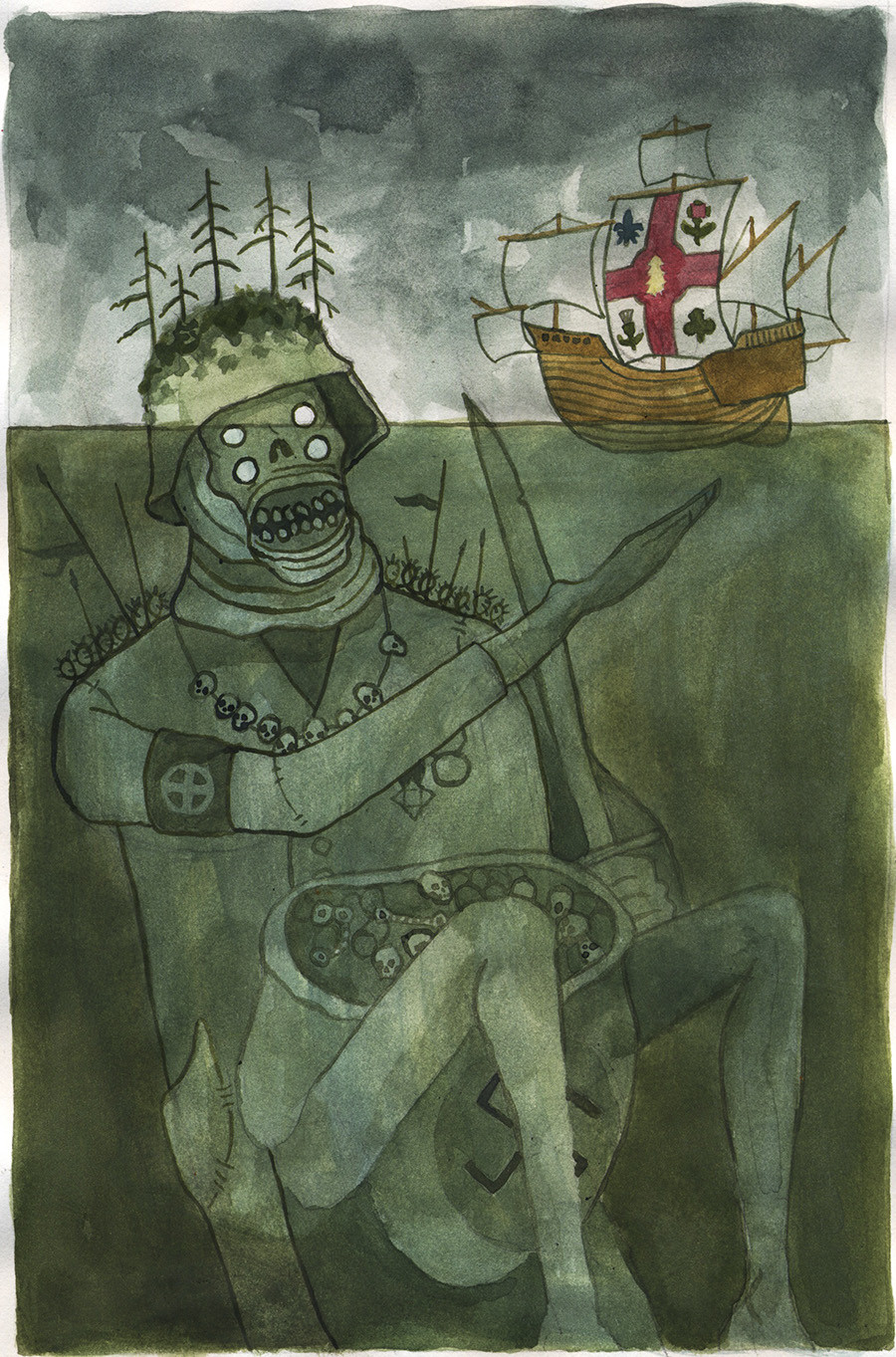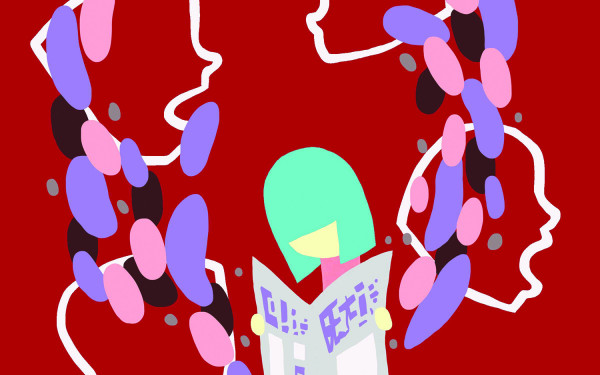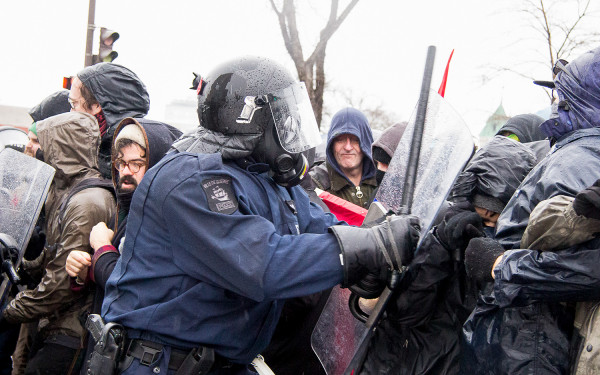Concordia’s Fight Against Fascism
What Does the CSU’s New Position Mean for Students?
Though the problem existed long before now, 2017 was in many ways the year of the rise of the far-right both here in Quebec and beyond.
In November, some 60,000 people marched the streets in a massive far-right demonstration in Warsaw, Poland—where, less than a century ago, hundreds of thousands of Jewish people were deported to concentration camps by the Nazis.
Participants from Poland and beyond congregated to share a message of white pride, xenophobia, and Islamophobia in what is now one of the largest such demonstrations in Europe’s history.
And that’s not even the half of it.
Europe, the main battleground of the fight against fascism in the last century, has recently seen an alarming surge in far-right, nationalist, and/or racist politics. It’s seen the election of far-right party members to the German parliament, and France’s presidential elections, when nationalist party Front National’s leader Marine Le Pen secured 34 per cent of the vote in the final round.
Here, an ocean away, we are not immune to the tide.
In the United States, Donald Trump’s election was both caused by and a catalyst for growing support for nationalist ideologies. Massive protests, like the “Unite the Right” rally that occurred in Charlottesville, Virginia on Aug. 12 have highlighted the increasing popularity and normalization of alt-right, neo-nazi groups in the country.
In Quebec, groups like La Meute and Storm Alliance are gaining traction and increasing their presence with sizable demonstrations held on Aug. 20 and Nov. 25 around the National Assembly in Quebec City.
The demonstration that happened on Nov. 25 could well be the largest far-right demonstration in the province since the 1930s, when the National Social Christian Party, which identified with nazism and anti-semitism, gained momentum in the leadup to the Second World War.
Around 400 La Meute and 250 Storm Alliance members came out. The Liberal government recently backed down on their plans to begin a commission into systemic racism, and changed their focus to instead plan a one day forum on promoting diversity and reducing discrimination in Quebec’s economy.
Despite the drastic shift in tone, both groups came out to oppose the upcoming forum, with many arguing that they were tired of “always being called racist.” La Meute even stood with their backs facing the National Assembly.
Atalante, a neo-nazi group operating in Quebec, made a brief appearance at the demonstration where they unfurled a banner near the National Assembly saying “Le Québec aux Québécois.”
But what is perhaps the most troubling aspect of the demonstration was the behaviour of the Quebec City police—who, in their efforts to protect the far-right groups, violently repressed the anti-racist and anti-fascist counter-demonstrators there. Despite a lack of provocation by the counter protesters, who were seriously outnumbered by the far-right groups, police used pepper spray to fend them off. The counter-demonstrators began throwing snowballs in response to being pepper sprayed, a fact that has been reported often by mainstream media as if to highlight their supposed “aggression,” taking it out of context by omitting the police’s provocation. But when Atalante made an appearance, police stood by and showed little reaction.
Clearly, 2017 is the year that the fight against fascism took on an urgent tone.
Of course, this means that anti-fascist groups across the globe are getting organized and showing up to the fight with growing numbers and intensity.
Here in Montreal, the Nov. 12 Grande manifestation contre la haine et le racisme put on by various anti-oppression groups is just one of many examples of local action to combat and raise awareness of the far-right both in our city and around the world. Well over 1,000 people joined the family-friendly march, chanting and singing songs in support of refugees and immigrants, diversity and equality.
That demonstration was endorsed by the Concordia Student Union at a regular council meeting in October. For that endorsement, they cited a new position added to the CSU positions book only a month before—a motion that explicitly opposes the rise of fascism and the alt-right locally and globally.
CSU Arts and Science Councillor Camille Thompson, who co-wrote the motion and presented it to council, confirms this position is a direct response to the current local situation in the fight against the far-right.
“You have La Meute […], you have Storm Alliance, which part of their group is neo-nazi and they are part of the far-right. And you have this increase of fascist groups and far-right groups, and Islamophobic ideas and racist ideas,” she says. “So I feel like it’s important for the CSU to have a clear stand on what is happening and to encourage the groups that are fighting against the rise of the far-right.”
Endorsing the demonstration was the first time the position had been used, and at the time of writing this article, it was one of two instances of its use. Rowan Gaudet, an Arts and Science councillor who co-wrote the motion with Thompson, says that there are no plans for the position within the CSU, but having it explicitly stated will make it easier for the CSU to provide assistance to anti-fascist groups working on or around campus.
“One of the main reasons to actually have a position is that, without any sort of direct position, it’s kind of strange for the CSU to be actively supporting something,” Gaudet says. “I don’t think the CSU is going to be the on-the-ground organizer, but kind of the support.”
The new position is an effective way to take a stand on the issue, and it’s encouraging that the CSU has openly denounced the far-right, in support of the many students who are part of marginalized communities targeted by groups in the province like La Meute.
“Concordia has a particularly diverse community and has a large proportion of more targeted communities in Quebec within the context of
xenophobia.” —Anas Bouslikhane
However, as the CSU is in a position of leadership for student groups around campus doing anti-fascist work, it would be nice to see the union filling that support role and proactively finding ways to make use of the position. Support for student groups is important, but it can and should extend past that.
“It’s actually pretty interesting that the CSU is one of the first larger associations that actually has a clear anti-fascist position,” says Anas Bouslikhane, anti-fascist activist with Solidarity Across Borders and former CSU finance coordinator.
“It being a position, it doesn’t actually entail them to act upon it. But that being said, it is a position that involves all students and the [Concordia] community so I would argue that they should potentially have a plan to act upon it in the near future, given the larger anti-racist and anti-fascist struggles that are coming up in [the next] few years that we’re seeing, and the rise of the far-right that’s happening.”
Gaudet and Thompson say that although racism and fascism affect a large number of students, it is not something that is specific to Concordia students or university students in general, unlike unpaid internships for example, so it’s to be expected that the position might not be acted upon as frequently.
It’s easy to make the argument that the CSU does not need a concrete action plan to combat the rise of the far-right now, but that would surely change when far-right groups begin to make more of an appearance on campus.
Throughout 2017, stickers had been found around campus promoting Generation Identity, an ethno-nationalist group that opposes non-white immigration, and The Daily Stormer, a neo-nazi website. Posters saying “It’s okay to be white” have also appeared, based on a concept developed by users of 4chan, an online message board populated heavily by the alt-right.
If far-right groups continue to impose themselves on our community in this way or escalate with more oppressive tactics, then it is the CSU’s obligation to ensure that action is taken to stop them.
It wouldn’t be the first time the CSU works to prevent on-campus oppression towards minority groups. Gaudet says that last year, when a journalist from Journal de Montreal came to Concordia’s Hall building and tried to take photos in the seventh floor Muslim prayer rooms, they worked with campus security to improve the security on that floor.
The CSU also got involved back in March when two far-right groups, the Canadian Coalition of Concerned Citizens and Soldiers of Odin, planned demonstrations at Concordia’s downtown campus. Those groups opposed a series of workshops called Learn to Resist put on by the Resist Trump & the Far-Right Network of Montreal.
“Concordia has a particularly diverse community and has a large proportion of more targeted communities in Quebec within the context of xenophobia,” Bouslikhane says, highlighting the importance of anti-fascist efforts at the university level.
CSU Mobilization Coordinator Ahmed Badr says their external committee approved $1,500 in funding for the Nov. 25 counter-demonstration. The money was used to secure transportation to Quebec City for counter-demonstrators coming from Montreal.
However, the CSU didn’t organize a Concordia contingent to the counter-demonstration, where the anti-fascist protesters were greatly outnumbered. Financial support is appreciated, but so is visible physical presence at far-right demonstrations.
The adoption of the position, though encouraging, means that the CSU has even more leeway, and therefore more of a responsibility, to assist the students targeted by the far-right. Over the next few months, it will be crucial to pay attention to how the situation plays out and when the position is used, as it will set the tone for future anti-fascist efforts around campus.
“I think it’s too early to say how it’ll look [now that] the motion has been adopted. I think they’ve been supportive in general of anti-racist and anti-fascist struggles,” Bouslikhane says. “But I think it takes a bit of time for them to be able to apply it more concretely and I think we might be seeing that more next semester.”
The fight against fascism has taken on an urgency that is unprecedented in this century, and the CSU’s effort to extend that fight into our university is crucial. The next few years will see rising tension here and around the world, and a position will soon not be enough for our community. Now that the CSU has gotten the bureaucracy taken care of, it’s time for real, concrete action.




1_600_375_90_s_c1.jpg)
11_900_647_90_600_375_90_s_c1.jpg)

